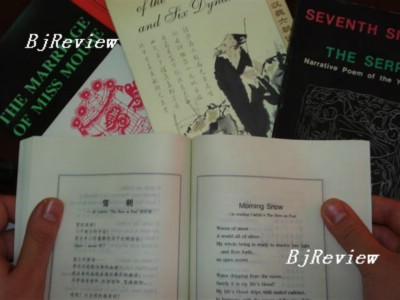
Like many other ancient cultures, China possesses an impressive and celebrated literary heritage. The master poets of the medieval Tang Dynasty (618-907), for example, are rightfully known as some of the world's best lyric poets; the adventures of the Monkey King and his company-as told in the classical Chinese narrative Journey to the West-have achieved a global following (in part due to TV adaptations and the like); and novels, short story collections and memoirs by expat Chinese authors living in the West have won major literary prizes and become international bestsellers.
It was therefore surprising and somewhat disappointing that, upon coming to China to teach writing at a university in mid-2006, I discovered that the average Chinese learner was far more interested in King Kong than the subtle yet profoundly insightful poetry of the Tang Dynasty genius Li Bai; or that when I mentioned Mulan (the heroine of an early Chinese oral narrative), I was told some trivia or other about a Disney animated adaptation of the story. Have the Chinese-especially the youth-lost all interest in the literary masterpieces of their own language as a result of the rapacious onslaught of popcorn Western culture?
My fears were somewhat allayed when I found out that Chinese primary school students still learn Tang Dynasty poems; that cultural events associated with the lives of literary icons-such as the Dragon Boat Festival-are celebrated each year; and that sites commemorating writers and their words-such as the Yellow Crane Tower in Wuhan, the inspiration for many generations of Chinese poets-are popular and well-preserved attractions. I was also pleased to gradually discover that not all Chinese youths are as crazy about throwaway popular culture as it first appeared and that many are in fact very enthusiastic about great poets and novelists.
But the problem remains that I have not been able to discover anything altogether new or exciting about either classical or contemporary Chinese writing in spite of having lived in a Chinese metropolis for more than a year.
Am I being pedantic? I don't think so. I'm not confident that China can sufficiently communicate and deal with the West-and the rest of the world, for that matter-without possessing the necessary means (adequate bilingual/multilingual publications for example) for educating the foreigners about her arts and culture. Being able to catch the tour bus to the Great Wall is one thing, being enticed and assisted to develop a deep and personal understanding of Chinese civilization is something else entirely.
The consequences of such a cultural inaccessibility go beyond causing irritation to demanding barbarians such as myself. As I write this, China's international profile rises as a major economic force in the global polity and she prepares to host multitudes of visitors from every corner of the globe during the Beijing Olympics. Sadly, the visitors will not be greeted by the works of the country's brightest writers and commentators in English and other international languages at the airport bookstores, and the newcomers will more likely than not resort to pirated DVD copies of Z-grade Hollywood films for entertainment during their time in China. China, in other words, will be deemed incapable of conveying her true sophisticated and intriguing identity to her potential partners and newcomers, and may be seen simply as a place where perfunctory Western cultural products are plagiarized and sold very cheaply.
Something needs to be done to obviate this very negative and I believe wholly unfair perception of China. A good place to start would be for Chinese publishers to produce a regular world-class literary journal featuring essays, poetry and fiction in English, similar to France's Paris Review or Algeria's Arabesque. Such a publication would at the very least placate academic detractors such as myself and would also prove to potential cynics that the Chinese do not see English merely as a "business tool" and actually care about the language's cultural and humanist dimensions. Chinese publishers could also commission new translations of important Chinese works as opposed to reprinting year after year Western classics like Pride and Prejudice. Last but not least, something needs to be done regarding the almost religious status afforded to Anglo-Western mass culture in China. An obsession with disposable American popular culture could be as unhealthy for the soul as an addiction to American fast food would be for the body.
The author is an Australian poet and literary critic currently teaching writing in Wuhan
| 